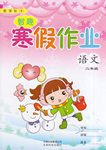题目内容
I never dreamed of there ____ such a quiet place in the noisy city.
A. was B. had been C. being D. to be
C

练习册系列答案
 智趣寒假作业云南科技出版社系列答案
智趣寒假作业云南科技出版社系列答案
相关题目
题目内容
I never dreamed of there ____ such a quiet place in the noisy city.
A. was B. had been C. being D. to be

 智趣寒假作业云南科技出版社系列答案
智趣寒假作业云南科技出版社系列答案